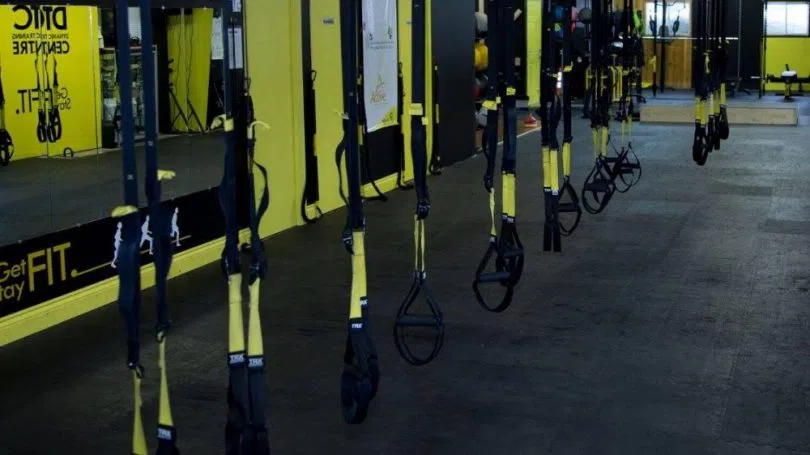
Dynamic Training Centre in Fredericton / Image: Ron Squires
Small business owners and sole proprietors across the province ineligible for the NB Small Business Recovery Grant are upset by the restrictions on the grant program.
The grant of up to $5,000 available through Opportunities NB was introduced by the provincial government to help small businesses regain lost revenue due to “red” and “orange” phases of the pandemic recovery.
A major benchmark that many small businesses are failing to meet in the ONB grant is the requirement of 2-99 full-time employees or the equivalent of 1,560 work hours per year. Sole proprietors like Melissa Hebert, who rents a chair as a hairstylist, are ineligible for the funding.
Hebert, among other small business owners, is finding their funding options outside of the ONB grant limited due to strict criteria.
“The criteria is pretty high. I feel like it’s more geared to larger businesses as opposed to smaller and a lot of them are just loans you still have to have to pay back so they don’t really apply to me,” said Hebert, who rents a chair from Moka Spa in Moncton.
“A lot [of the other funding options] are deferrable debt that you can only use the money for a certain thing and need to prove it. So, I pay rent and that doesn’t fall under insurance and deferrable debt,” said Hebert.
Dave Robichaud, the owner of Raise the Bar Fitness in Moncton, agrees that the minimum of two full-time employee eligibility criteria in the ONB grant leaves out many small businesses that employ lots of part-time employees, but the owner acts as the sole full-time employee.
“Some of the boutique gyms, I’m assuming most of the CrossFit gyms in the area, don’t fall in that category. And so it affects entrepreneurs,” said Robichaud. “So that would really help gyms like a GoodLife or a Fit For Less where they have those number of employees – gyms that would require it less than some of these smaller gyms.”
The grant from ONB is the only funding option for businesses at the provincial level that do not require repayment. Other options are limited to capital loans and federal options such as the Canada Recovery Benefit.
According to Premier Blaine Higgs, the $5,000 grant includes the provision of two full-time employees to manage applications and ensure the businesses applying were registered and certified.
“If there are businesses that feel they don’t qualify, and the reasons aren’t understood by them, they should review that with ONB,” said Premier Blaine Higgs at Tuesday’s Covid briefing. “Certainly, they can make their case because that is the system we set up to understand clearly the direct impact that businesses have had, and how we can best mitigate that through our grant formula.”
Pat Corkum, owner of Dynamic Training Centre in Fredericton, is left out of the grant from ONB’s eligibility due to having a mostly part-time staff and is facing similar woes in accessing funding for his business affected by “orange” and “red” levels of recovery.
“I hate the misconception out there that there is all kinds of money for people like me, but there’s always a catch-22 or something that makes it unavailable for me,” said Corkum. “Like, get a loan, even though if you pay it back in two years, you get $10,000 off. But if I have to get a loan, then it’s because I can’t pay it back in a couple of years, so it’s just crazy.”
Corkum has been working through the pandemic trying to clarify regulations that, in his view, have been unreasonable for gym owners and their members.
RELATED: How An N.B. Small Business Can Qualify For The $5,000 Grant
When his zone entered the “orange” phase in November, he worked to change a regulation that mandated patrons wear a mask at all times, including when doing intensive workouts. In January, he received permission from public health to allow visitors to work out in classes less than 10 feet apart so long as they are from the same household bubble.
“I’ve been relentless like a dog on a bone trying to save my business. It’s hard work,” said Corkum.
Like many other business owners, Corkum worries about his business’ future as he faces restrictions on his business operations without the capability to access relief.
“I don’t feel like I’m going to be open much longer if it keeps going this way. I’ve been here for eight years and I have an award-winning facility. It doesn’t matter what your recognition is. You’re just a nobody unless you’re a big business.”
Corkum says that he has seen many businesses close their doors over the course of the pandemic, and believes it’s only a matter of time until he does the same.
“I had to take the last out of my own personal savings to go put on my credit card to pay for my rent for this month,” said Corkum. “That is the most disheartening thing I got to do to try to save my business. And if that’s the last out of my savings, I have no idea how I’m going to cover next month’s rent. And I know so many people like me that just shut their doors.”
Liam Floyd is a reporter for Huddle, an Acadia Broadcasting content partner.






